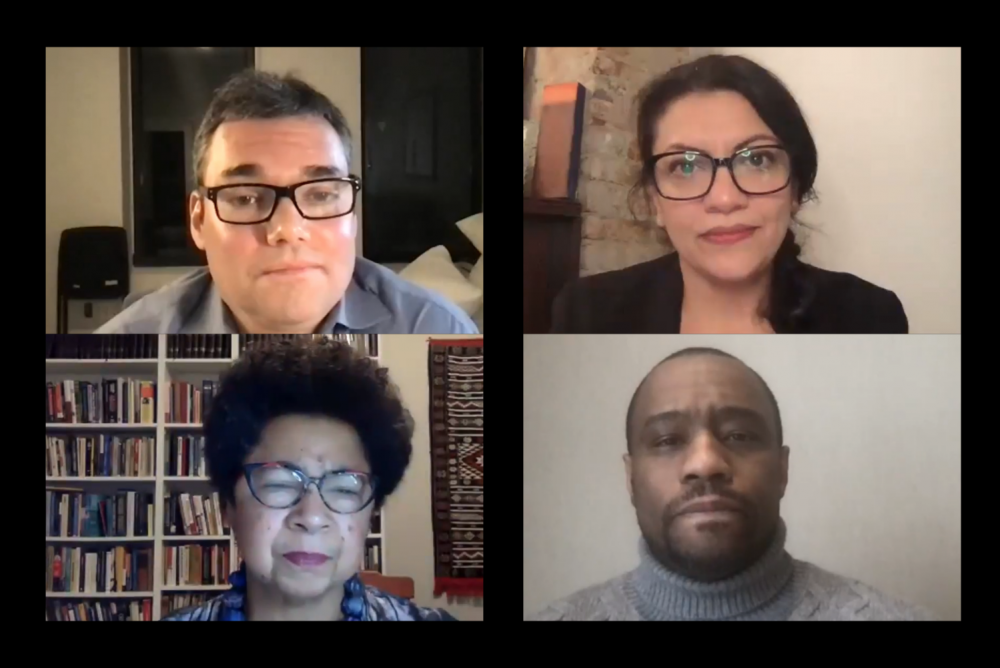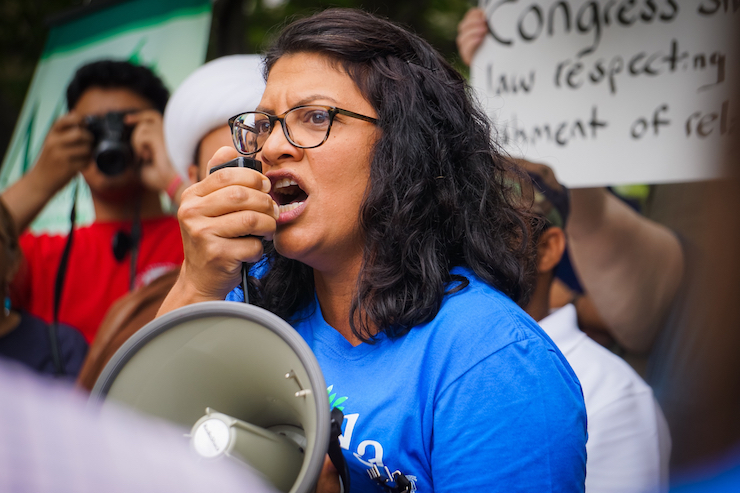Jewish Voice for Peace held a panel Tuesday night entitled “Dismantling Antisemitism, Winning Justice,” featuring Michigan Congresswoman Rashida Tlaib, scholar and author Marc Lamont Hill, University of Illinois at Chicago professor Barbara Ransby, and journalist and commentator Peter Beinart.
What these four speakers have in common is not their expertise on anti-Jewish racism. Rather, they have all been targeted by accusations of antisemitism because of their political views on Israel-Palestine, including for supporting a binational state and the Boycott, Divestment and Sanctions (BDS) movement.
In that sense, it may have been more accurate to frame the panel around the weaponization of antisemitism and its role in policing the debate on Israel-Palestine, rather than dismantling antisemitism itself. Nonetheless, the webinar highlighted the importance of communities working together against common threats of racism, oppression and state violence, and provided a reminder of the painful price some pay for criticizing Israeli policies.
The discussion attempted to place the fight against antisemitism within the greater progressive struggle against all forms of structural racism and oppression, and dispel the notion that anti-Zionism is antisemitism. Emphasizing the point, Jewish Voice for Peace Co-Director Rabbi Alissa Wise, who mediated the event, said at the outset that “a free Palestine is required if we want a free world for everyone — including Jews.”
The demand for a panel of this kind, which nearly 1,000 participants attended on Zoom and another 2,500 on Facebook Live, illustrated how many in the progressive movement recognize that antisemitism in the United States is being monopolized, abused, and obscured to serve pro-Israel politics.
The panel drew predictable criticism from staunch pro-Israel figures known for their intolerance of non- and anti-Zionist views, in part because the panel only featured one Jew. Far-right American Jewish philanthropist Adam Milstein tweeted that Tlaib and Lamont Hill are themselves antisemites, while commentator Bari Weiss tweeted sardonically that antisemitism was being turned into “right-wing disinformation.”
Pro-Israel advocates have repeatedly accused Tlaib of being antisemitic since she first took office in 2019, most recently for retweeting the phrase “From the river to the sea, Palestine will be free,” which she later removed. The Congresswoman could not even tweet a Hanukkah greeting last week without being trolled with hostile responses, some of which promoted narratives of Israeli nationalism and Jewish supremacy.
Lamont Hill was fired from CNN in 2018 after saying at the United Nations, like Tlaib, that there should be a “free Palestine from the river to the sea;” he too later apologized. Ransby, who, like Tlaib and Lamont Hill, has endorsed the BDS movement, has been targeted by Canary Mission, a website that blacklists and intimidates students and professors who criticize Israel. Beinart, the only Jew on the panel and a self-identified “cultural Zionist,” recently stirred controversy — and earned his own accusations of antisemitism — after publishing an essay in Jewish Currents calling for a binational state for Israelis and Palestinians.
An interconnected struggle
The panel, by its very composition, sought to dispel the notion that only Jews can and should speak about antisemitism. Asked about their first encounters with antisemitism and how it plays out in their work and lives, Rep. Tlaib recounted how, in 1990, her public high school in Detroit had faced pushback for acquiring new textbooks that included African American history; the backlash, she said, exposed her to anti-Black racism and other forms of bigotry including antisemitism, Islamophobia, and anti-immigrant attitudes.
Tlaib also shared her experience working closely with a Jewish floor leader in the Michigan legislature, who shared his own experiences as a Jew and was one of the few colleagues standing up against anti-immigrant policies. “I realized how antisemitism was so connected to my freedom, to my right to live as a Muslim in our country, as a child of immigrants,” she said. Tlaib connected these lessons to her work in fighting for access to clean water and living wages, noting that her “Jewish neighbors” were regularly fighting those battles alongside her.
Echoing this interconnectivity, Ransby, whose husband is Jewish, spoke about the swastikas and Confederate flags she saw as a teenager in 1970s Detroit. She said it did not take her long to realize that antisemitism, anti-Black racism, and Islamophobia are all part of a “deadly trilogy.”
Lamont Hill, who described his encounters of antisemitic smears against Jews in his activism for the rights of Black people, said: “I can’t imagine a vision of freedom, that does not include Jewish people. How are Black folk going to be free and Jewish people not? How are men going to be free and women not? It’s an inclusive vision.”
For Beinart, such inclusivity had become a serious challenge within the Jewish community when it comes to politics around Israel. “It’s critically important we fight for the right of anti-Zionist Jews and anti-Zionist non-Jews to be a part of the Jewish community, part of these conversations,” he said. “But I also think it’s important to say that Zionist Jews should not be excluded from progressive spaces,” he added.
Beinart went on to make a full-throated defense of his fellow panelists against accusations of antisemitism. “I know that there are probably a lot of people who are watching this who came to watch it because they don’t like the folks on this panel,” he said. “Listen to the folks on this panel and what they said. Do they sound like people who hate Jews to you? Trust your gut.”
To that, Tlaib responded, “I was tearing up. Tell everybody, ‘I don’t hate you, I absolutely love you.’”
Watching the event, it was evident how much the warped discourse that links criticism of Israel and advocacy for Palestinian rights to antisemitism has had severe consequences for those fighting to interconnect struggles and express solidarity. Indeed, the insistence on defending oneself against accusations of antisemitism, often hurled for insidious political gain, ends up being a distraction from the real issues at hand: the need to identify and confront antisemitism in and of itself in all its contemporary variations, and the fight for equal rights for all Palestinians living between the Jordan River and the Mediterranean Sea.



